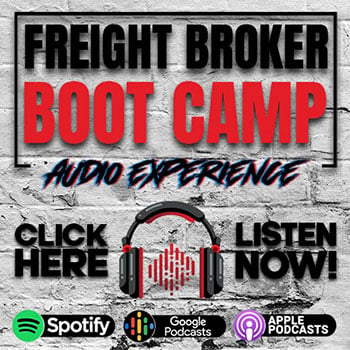For those new to the logistics industry, you might be confused regarding the difference between a FREIGHT BROKER vs DISPATCHER?
The main difference between a freight broker and a dispatcher is simple and lies in who they work for. Brokers work on behalf of and are paid by shippers, while truck dispatchers work for and are compensated directly by the motor carrier.
Let’s take a little deeper dive so we help you to better understand the similarities and differences between a freight broker vs dispatcher.
What is a dispatcher?
Independent dispatchers, also known as truck dispatchers, work with trucking companies to find loads for truck drivers to haul, coordinate shipments, and help streamline carrier operations for owner operators and small motor carriers.
They are the middle men between freight brokers and truck drivers. Dispatchers can either be independent contractors or W-2 employees of a trucking company.
Good dispatchers make it easier for a trucking company and owner operators to find available loads and schedule pickup and delivery appointments, especially while truck drivers are on the road.
How does a dispatcher get paid?
Independent dispatchers are compensated directly by the trucking company for helping them find loads and negotiate the best rates on their behalf.
Industry averages for independent dispatcher pay range from 5 – 10% of amount paid to the carrier for the load.
Example: Broker pays carrier $2,000 to haul load. Carrier pays dispatcher $100 – $200 commission depending on agreed upon compensation plan.
What is a freight broker?
A freight broker is licensed by the FMCSA and acts as a middle man between shippers needing transportation services and asset based trucking companies willing to haul the load.
A freight brokers job mainly consists of finding reliable carriers to haul their shipping customers freight. They then manage and monitor the freight from pickup thru to deliver.
Freight brokers save shippers time by leveraging their expertise, technology and a their network of trucking companies and owner operators. They ensure freight delivers on time and in good condition, with no damage.
How does a freight broker get paid?
Unlike dispatchers, freight brokers invoice shippers for their service and directly pay carriers for hauling the loads. The difference between the amount they are paid by the shipper and the cost to haul the load, is their profit.
Click Here to Learn How Much Top Freight Brokers Can Make!
Freight brokers typically earn between 10-20% gross profit per load they manage for their clients.
Example: Shipper pays broker $2,000 to move load. Broker then pays carrier between $1,600 and $1,800. Leaving a profit of $200 – $400 for the broker.
What is the difference between a freight broker and a freight dispatcher?
While freight broker and independent dispatchers are similar, there are key differences you need to understand. The main difference between a freight broker and dispatcher is who they work for.
Freight brokers work for and are compensated by shippers, while dispatchers work for and are compensate by trucking companies and owner operators.
Another difference is the fact that freight brokers are both bonded and licensed by the Federal Motor Carrier Safety Administration.
On the other hand, independent dispatchers do not require a license but they are strictly prohibited from acting as a broker. Unauthorized brokering can lead to a $10,000 fine per incident.
Dispatchers and brokers are NOT competitors, the reality is they can be complementary roles in the transport and logistics industry.
Difference Between A Freight Broker vs Dispatcher

Can you be a freight broker and dispatcher at the same time?
The short answer is YES.
The long answer is much more complicated.
The hard part about being both a broker and a dispatcher is the potential for a conflict interest.
The fact is, you can not represent both sides in a transaction, so how would you determine who exactly you are working for on any given transaction?
Another issue might be the confusion for both the shipper and the motor carriers. When you are speaking to the carrier are you acting as their dispatcher or as a broker? Same goes for shippers.
If you are considering operating as a both a licensed freight broker and an independent dispatch service, here are some things to consider.
1) Set up different LLC’s,
2) Different companies names
3) Different phone #’s
4) Do NOT commingling finances
5) Follow FMCSA ruling as it related to independent dispatching.
*This is not legal or financial advice just my personal opinion.
Frequently Asked Questions (FAQ)
1. Is a dispatcher the same as a freight broker?
Not even close. Dispatchers work for carriers, while freight brokers work for shippers.
A dispatcher can find loads for a few trucks but a licensed freight broker can move freight for hundreds of customers nationwide, manage multiple carriers, and earn profit on every load.
Brokers operate real businesses with recurring customers, scalable systems, and long-term growth potential.
2. Who makes more money dispatchers or freight brokers?
On average, freight brokers earn 2–5× more than dispatchers.
Dispatchers typically earn 5–10% of the carrier’s revenue, while brokers earn 10–20% profit margins on shipments.
Plus, a broker can grow from one person to a team of agents or employees meaning your income isn’t limited by how many trucks you can manage personally.
Bottom line: Brokers have higher earning potential, better scalability, and real resale value if you ever sell your business.
3. Do dispatchers need a license?
No FMCSA license is required for dispatchers, but that also means you can’t legally broker freight or earn margin between shippers and carriers.
Freight brokers, on the other hand, hold FMCSA authority and a $75,000 surety bond, giving them the credibility to work directly with customers and build a legitimate, scalable logistics business.
4. What software do brokers and dispatchers use?
- Freight brokers use transportation management systems (TMS), CRM platforms, accounting software, and carrier vetting tools to manage hundreds of loads.
- Dispatchers mainly rely on load boards, spreadsheets, and email. If you want to build a business that runs without you doing every single task, the broker model gives you automation and leverage that dispatching doesn’t.
5. How can a dispatcher become a freight broker?
Start by learning the fundamentals of freight sales, carrier compliance, and customer onboarding.
Then apply for your FMCSA broker authority (MC number) and secure your $75,000 surety bond.
With proper training, many dispatchers make the leap to brokerage within 60–90 days — and immediately see their income potential multiply.
6. Can a freight broker dispatch trucks too?
Yes but keep the two operations separate.
A broker focuses on finding, pricing, and managing loads for shippers.
If you dispatch trucks under a carrier’s DOT number, keep those transactions in a different business entity to stay compliant and avoid conflicts.
7. Is dispatching a good way to start in the freight industry?
It can be. Dispatching is a low cost, low- starting point to learn how freight moves.
But once you understand carriers, rates, and operations, moving into brokerage lets you earn more per load, scale beyond your time, and build a real brand in the logistics world.
In short: Dispatching is a job. Brokering is a business!
Which job is best for me?
When choosing to become a freight broker or a dispatcher, you need to look at your goals and needs. At first glance, it might not be clear which job is right for you.
You’ll want to do your homework and learn all you can about the industry and each job. Look at the roles and responsibilities of both freight brokers and dispatchers and decide the one that best fits your goals.
On a personal note, I think a freight brokerage has a much bigger upside financially. Which can later be sold to a or handed down to family members as part of your retirement strategy.
Whichever you decide to pursue I am pulling for you and look forward to hearing your success story down the road.




Hello Mr. Brown, My Name is Darren Young I’m interested in your course. I have a new Brokerage. I need help getting started. My number is+13102510108
March 3, 2025 at 3:46 pmCongrats! How can we help?
March 8, 2025 at 5:31 pmHello Mr. Brown, My company is Agbedina LLC. I’m interested in your course. I have a new Brokerage license with all my FMCSA AND BOND ready. I need help getting started. My number is (240-277-1770)
March 13, 2025 at 11:30 amSure you can check out my Freight Broker Boot Camp startup program at http://www.freightbrokerbootcamp.com OR you can check my Freight Broker Sales coaching program at http://www.freightbrokerbootcamp.com/waitlist
March 18, 2025 at 10:35 pm